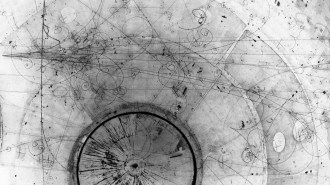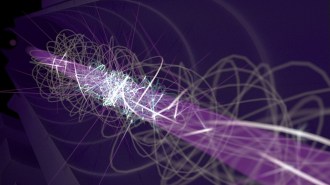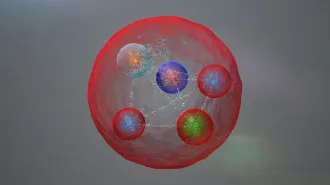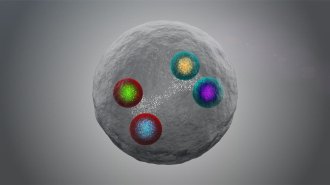Particle Physics
-
 Particle Physics
Particle PhysicsDoubt cast on theorized ‘sterile’ particles leaves a neutrino mystery unsolved
MicroBooNE weakens the case for sterile neutrinos, but the mystery that shrouded earlier neutrino experiments remains.
-
 Particle Physics
Particle PhysicsHow particle detectors capture matter’s hidden, beautiful reality
Old and new detectors trace the whirling paths of subatomic particles.
-
 Particle Physics
Particle PhysicsPhysicists dream big with an idea for a particle collider on the moon
A lunar particle collider that dwarfs any such facility on Earth might not be impossible, according to new calculations.
-
 Particle Physics
Particle PhysicsIn a first, neutrinos were caught interacting at the Large Hadron Collider
Despite the LHC’s fame, all its detectors were oblivious to neutrinos. But not anymore.
-
 Particle Physics
Particle PhysicsThe thickness of lead’s neutron ‘skin’ has been precisely measured
At 0.28 trillionths of a millimeter thick, the shell of neutrons around the nucleus of an atom of lead is a bit thicker than physicists had predicted.
-
 Particle Physics
Particle PhysicsThe already tiny neutrino’s maximum possible mass has shrunk even further
At less than an electron volt, neutrinos are by far the most lightweight massive particles known, a new measurement confirms.
-
 Particle Physics
Particle PhysicsHow matter’s hidden complexity unleashed the power of nuclear physics
In the last century, physicists learned to split atomic nuclei and revealed a complex world of fundamental particles.
-
 Particle Physics
Particle PhysicsMuon magnetism could hint at a breakdown of physics’ standard model
After two decades, a new measurement of the muon magnetic anomaly reinforces earlier hints that its value disagrees with standard physics.
-
 Physics
PhysicsNewly made laser-cooled antimatter could test foundations of modern physics
Physicists have finally used laser cooling to tame unruly antimatter atoms. That could allow new tests of symmetry and Einstein’s theory of gravity.
-
 Particle Physics
Particle PhysicsProtons’ antimatter is even more lopsided than we thought
The SeaQuest experiment finds that down antiquarks within the proton are more prevalent than up antiquarks.
-
 Physics
Physics50 years ago, scientists were on a quest for quarks
In the 1970s, physicists confirmed particles called quarks existed. Fifty years later, many kinds of quarks in many combinations have been discovered.
-
 Particle Physics
Particle PhysicsThis is the first known particle with four of the same kind of quark
A weird four-quark particle could be a unique testing ground for the strong force that governs how quarks stick together.